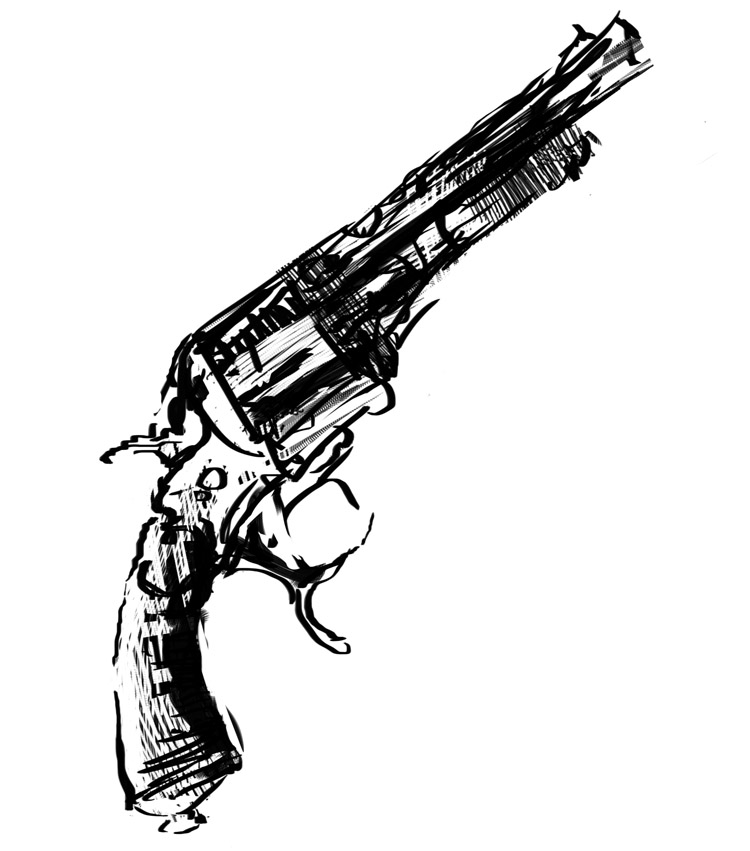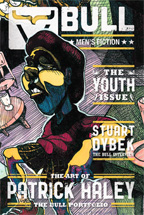Pale light crept into the black stanchions of pine, the ashen ground, the red center of dying coals. The camped men rose silent and broke the bread, hard as stone, between blackened fingers. One of their number looked at his own. Soot and powder, ash and dirt. Neat crescents accrued underneath the nails, trim and black, like he’d tried to dig himself out of a hole in the ground. Or into one.
Some of the others chewed loudly, bread dry in dry mouths. No tins rattled. There was no coffee, not for some days. He wanted always to talk in this quiet of early morning, to speak something into the silence that uncoupled them from the close pallet of slumber. That assembled them into the crooked line of horsemen, no colors among the trees. No badges, no uniforms. He wanted to ask what quietude might linger if they hovered here longer in the mist, did not mount and ride. But they always did.
So he sprang up first. He shoved the last crust down his gullet and kicked old Swinney where his britches failed him.
“Goddamn katydid,” said Swinney, second-in-command.
“Least I ain’t a old ash-shitter.”
“You be lucky to get this old, son. Right lucky this day and age.”
“Lucky as you?”
Old Swinney hawked and spat a heavy clot into the coals.
“Luckier.”
They rode horses of all colors, all bloods. Strays, they called them, tongues in cheek. Horses that offered themselves for the good of the country, under no lock and key. The quality of a man’s mount was no measure of rank, a measure instead of luck and cunning and sometimes, oftentimes, cruelty.
The boy went to mount his own, a fly-bitten nag with a yellow-blonde coat in some places, gray patches of hairless skin in others. She’d been a woman’s horse once, most likely. The men had used to joke about this. Then one of their favorites, an informal company jester, was blown right from her back. The mare had stood there unmoved, flicking her ears, biting grass from the trampled soil. No one save the Colonel enjoyed a horse so steady. They left off joking.
The boy stuck one cracked boot into the stirrup, an ill-formed shape clanged from glowing iron by an idiot smithy. Or so the men had told him. They told him many such things, their faces fire-bitten and demonic over the cookfire, the embers circling like burning flies. The boy believed them all. Never the facts, the names, or the settings. But what they were getting at, this he believed. There was faith in their eyes, so black and silvered—like the move of steel in darkness.
Rays of dawn shot now through the black overhang of trees, spotting the ground with haloes of warped design. The rest of the men slung themselves into their saddles, a cadre of stiff-jointed grunts, and some of them stepped their horses into the light. The boy saw them go luminous among the black woods, specter-like, like men elected to sainthood. Faces skull-gone, mouths hidden in the gnarled bush of their beards, showing only their teeth. The tools of war hung by leather belts, pistols and knives and back-slung scatterguns of all gauges. This hardened miscellany jolted and clanked as their horses tapered into the long irregular file of their occupation.
They rode the forest until the white face of the sun hung right above them and the insects clouded so meanly the men soiled their cheeks and foreheads with dirt and ash. The horses flicked the mosquitoes from their rumps with their tails. The skin of man and animal both grew spattered with spots of burst blood. They rode unto the verge of a small green valley of sparse trees. There was a farmhouse down there, a barn. Out of habit they stopped for lunch though there was little to drink and less to eat. They stopped within the cover of the trees so as not to be seen from the valley below.
When the boy dismounted his horse, old Swinney slapped him on the shoulder.
“Welcome to Virginny,” said the old man.
“Virginia?” said the boy, his eyes going wide.
He crept toward the edge of the trees, his face dark amid the shadows. He could feel the older men’s eyes upon him, their ears attuned to the snap of stick or shrub. They listened because he made no sound, this boy, the lightest of foot among them. A former horse thief, his skills translated readily to their pursuits. At last he stared down upon the rough-planked barn, the once-white house, the single white pig mired in a sagging pen of mud. He stared down upon Virginia for a long time, a stranger to this country.
When he returned the men were tightening the holsters they wore and sighting their rifles and sliding their knives back and forth in their sheaths, back and forth, making sure no catches might slow the draw. At this juncture the boy was possessed of a French dueling pistol of uncommon caliber. He mounted up and pulled the heavy j-shaped weapon from his belt and thumbed the hammer back. The filigreed metal of the action spun and clicked into place over the rich wood frame scarred by countless run-ins with his belt buckle, tree branches, roots where he’d dropped the thing practicing his pistoleer skills.
Swinney stood below him.
“You got any bullets left for that thing, boy?”
The boy held the pistol toward him butt-first.
“She’s a firecracker,” he warned, smiling.
When the older man reached for the pistol the boy dropped it sideways from his hand and hooked it upside down by the trigger guard and spun the gun upon its axis and caught it by the backstrap, the trigger fingered, the barrel at Swinney’s chest, the older man’s eyes wide with fright.
“Let them sons of bitches learn the hard way,” said the boy.
In fact he did not have any bullets. He was out.
Swinney’s eyes narrowed and he shook his head.
“What you need is a good ass-whupping, boy. Not them parlor tricks.”
The boy spun the gun twice and stuck it in his belt.
“Now don’t you get jealous on me, Swinney.”
The older man made a derisive gesture and waddled down the line.
The provenance of the pistol was known—one of a pair from the vast arms collection of an officer they’d kidnapped from his bed. The boy’s first of such prizes. He’d been promptly swindled of one of the guns in a bet over the height of a sycamore fated for firewood. That left him one pistol and five balls for the smoothbore barrel. Two went to target practice, one to drunken roistering, one to a duel with a blue jay on a fencepost (lost), and the last plumb lost along the way…
GET THE REST IN THE NEW BULL #5

